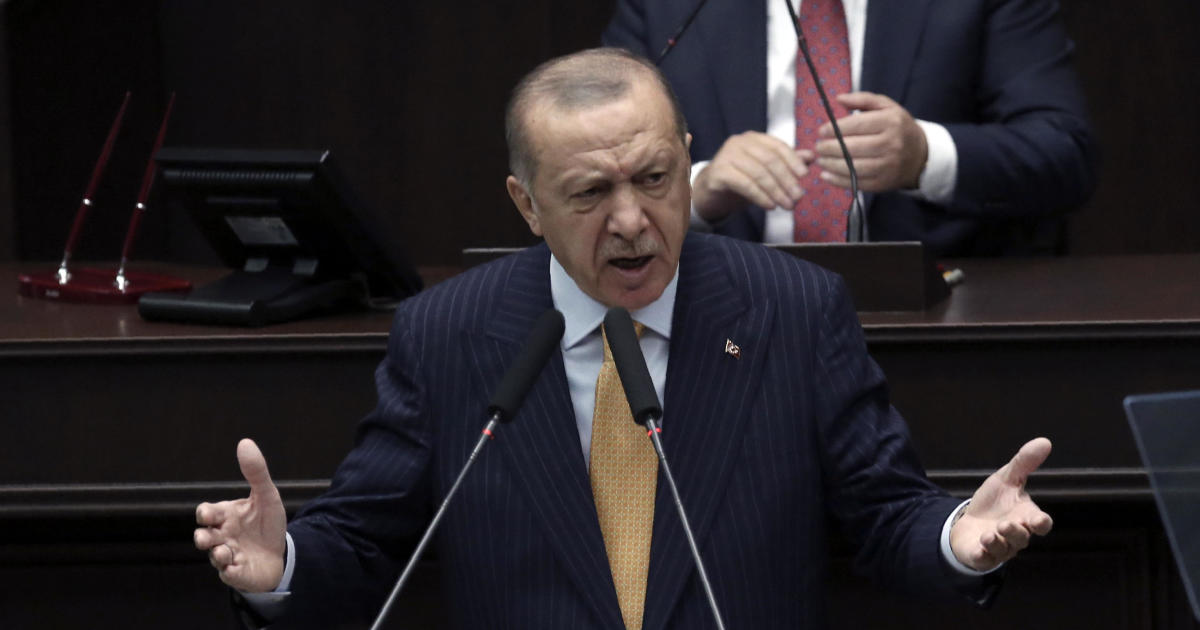Turkish officials on Wednesday railed against French satirical magazine Charlie Hebdo over its cover-page cartoon mocking Turkish President Recep Tayyip Erdogan and accused it of sowing “the seeds of hatred and animosity.” The cartoon could further heighten tensions between Turkey and France, which erupted over French President Emmanuel Macron’s firm stance against Islamism following the beheading of a teacher who showed his class caricatures of the Prophet Muhammad for a free speech class.
The Prophet cartoons upset many in the Muslim world. But it was Erdogan who led the charge against France and questioned Macron’s mental state. France then recalled its ambassador to Turkey for consultations, a first in French-Turkish diplomatic relations.
“We strongly condemn the publication concerning our president of the French magazine, which has no respect to faith, the sacred and values,” Erdogan’s spokesman, Ibrahim Kalin, wrote on Twitter.
The Ankara Chief Prosecutor’s office launched an investigation into Charlie Hebdo managers over the cartoon, the state-run Anadolu Agency reported. Insulting the president is a crime in Turkey punishable by up to four years in prison.
Erdogan himself said he had not looked at the drawing and had nothing to say about the “dishonorable” publication.
“My sadness and anger does not stem from the disgusting attack on my person but from the fact that the same (publication) is the source of the impertinent attack to my dear Prophet,” Erdogan told his ruling party’s legislators in parliament.
He went on to criticize France and other Europe nations’ colonial past saying: “You are murderers!”
Turkey’s President Recep Tayyip Erdogan addresses his ruling party lawmakers at the parliament, in Ankara, Turkey, Wednesday, Oct. 28, 2020.
AP
Tensions between France and Turkey have mounted in recent months over Turkish actions in Syria, Libya and the Caucasus Mountains region of Nagorno-Karabakh.
The cartoon depicted Erdogan in his underwear holding a drink and lifting the skirt of a woman wearing an Islamic dress.
“I condemn this incorrigible French rag’s immoral publication concerning our president,” Turkish Vice President Fuat Oktay wrote on Twitter. “I call on the moral and conscientious international community to speak out against this disgrace.”
Macron’s stance sparked anti-France protests in Turkey and in other Muslim countries as well as calls for the boycott of French goods.
In Egypt, the country’s top Muslim cleric called on the international community to adopt universal legislation criminalizing anti-Muslim discrimination and activities.
At a gathering celebrating Prophet Muhammad’s birthday, Sheikh Ahmed al-Tayeb, Al-Azhar’s Grand Imam, also condemned the slaying of the French teacher in Paris as “an odious and painful murder.”
He said that offending Islam and Muslims has become a tool to mobilize votes. He called the “offensive cartoons” depicting Muhammad “a blatant hostility against this noble religion and its prophet.”
He urged Muslims to resort to peaceful and legal means to “resist hate speech,” and those in Western countries to integrate “positively and consciously” in their societies.
Speaking at a Cabinet meeting, Iran’s President Hassan Rouhani also weighed in on the debate.
“If Europe and France are after rights, ethics and culture they have to withdraw from intervention in Muslim affairs,” Rouhani said.
